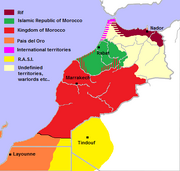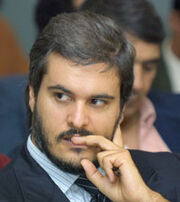Forward | |||
| Capital | Marrakech | ||
| Largest city | Marrakech | ||
| Language | Arabic | ||
| King | Moulay Hachim | ||
| Prime Minister | |||
| Currency | Moroccan Dirham | ||
Morocco (Arabic: المغرب, al-Maġrib), officially the Kingdom of Morocco (المملكة المغربية, al-Mamlakah al-Maġribiyya), is a country located in North Africa. Its capital and largest city is Marrakech.
History
Although Morocco has not suffered the impact of nuclear weapons in September 1983 was affected by the weapons exploded in Rota and Gibraltar, whose radio hit the cities of the Straits of Gibraltar, and the emps, in the days following the 26 also suffered the effects of radioactive storms, forcing the government of Hassan II to the evacuation of the lands near the Strait to the river Sebu including major cities such as Tangier, Larache, Ksar el-Kebir, Uazan, Asilah, Agadir and Tetouan.

Moroccan lands in 2009
Such a mass of sick and starving refugees was impossible to meet, and soon succeeded riots in the cities of central Morocco: Fez, Meknes, Casablanca, Salé and Mehdia and even in the capital, Raabat. In the provinces of Rif the riots took the form of a separatist rebellion that was assisted refugee Spanish army in Melilla. At the end of 1983 the Moroccan government had lost control of almost all territories in the north. This state of affairs forced the government to withdraw to Marrakech, the only major city that remained at peace.Because of the death of Hassan II in New York (where he participated in a meeting of the United Nations Assembly) opened a succession crisis in the Kingdom: On the death of Hassan his natural successor would have been his son Mohammed, but the principle of succession by primogeniture rule was not firmly established and the most democratic moroccan politicians preferred Moulay Hicham, Hassan's cousin, second in line succession, nicknamed the "Red Prince". Mohammed VI, Hassan's young son is acknowledged in Marrakech, but in bad terms with Driss Basri - until his father's powerful minister- dismissed him and appointed Prime Minister Mohammed Yassine Mansouri, Basri is passed next to Moulay Hicham, who took the power in Agadir. Moulay Hicham, suspicious of Basri, form a government headed by Khalid Naciri and with Mohamed Benaissa as foreign minister, former mayor of Asilah and had performed duties at FAO Adviser. While the Polisario in the south seized the opportunity to gain control of the territory with the help of Spanish troops from Canary. Pais del Oro providing assistance to Moulay Hicham. The War of Succession in Morocco occupied the PdO Army during the next decade, from 1986 until 1994, after the battle of Safi when a revolt of officers in Marrakech forced into exile Mohammed, leaving Moulay Hicham king in the south while in northern Morocco took the power the islamists (mainly led by Abd as-Salam Yassin and Mohamed Bachiri, who established in 1989 in Rabat, the Moroccan Islamic Republic). and several warlords. PdOr continued in subsequent years holding militarily to Moulay Hicham in his reconquest of the northern territories and the consolidation of a democratic order in Morocco.
Politics

The King Moulay Hicham I
In 1996 a Constitutional Convention was convened in Marrakech, this assembly defined Morocco as a constitutional monarchy with a bicameral legislature, the King retains broad powers as military commander the authority in religious matters or the power to dissolve parliament, the Parliament also has the power to elect or depose the Prime Minister and Cabinet members.
The Majlis an-Nuwwab House of Representatives consists of 220 representatives elected every four years in different constituencies and 30 elected in single constituency (and whose candidates can only be women to ensure the presence of the same in the House).
The Majlis al Moustasharin Senate or House of the Directors is composed of 100 Representatives elected indirectly by periods of 8 years. 60 of the representatives are elected in each region by an electoral college composed of representatives of local councils and regional and provincial prefectures, the other 40 are elected in each region by an electoral college composed of professionals of industry, trade and economy.
The main political parties are the Socialist Union of Popular Forces USFP, center-left, the Istiqlal Party, nationalist, the Movement for Unity and Reform MUR, moderate Islamist, the National Association of Independent RNI, moderate right, and the Movement Popular MP, Conservative.
The 1996 Constitution theoretically divided Morocco into 10 regions in turn divided into provinces and prefectures, but the government only has authority over five of them: Souss-Massa-Draa, Marrakech-Tensift-Al Haouz, Doukkala-Abda, Tadla-Azilal and Meknès-Tafilalt.
Foreign Policy
Moroccan politics has been marked for years by some patronage over its southern neighbor. With the arrival of 2000 started opening to the outside and a remarkable economic boom that has broken the bonds that kept her tied to the new Spanish nation. With the new century Morocco had won initiative and independence in its foreign policy.
The main objective of this policy is the defeat of the Islamic Republic of Rabat and other factions that control northern Iraq. For this need, formally the government of Moulay Hicham has not challenged the Spanish sovereignty over the Saharawi territories south of Wadi Draa or independence of the Rif (though not yet established formal diplomatic relations with the republic). But informally began long approach to the Saharawi Republic in Tindouf, which dispute the mastery of the Spanish Sahara.
Demographics
Although no reliable data it is estimated that the share of Morocco controlled by the government of Marrakech adds more than 10 million people.
The immigrant population housed in refugee camps scattered across the south coast and more than 200,000 residents total. Origin is mainly French, Algerian, Portuguese and Spanish, plus some English and German.
Economy
The main activity is agriculture in Morocco. The fishing sector in Morocco is a major foreign exchange earner, accounting for 56% of agricultural production and 16% of total exports. For too long the industry has been an economic mainstay for the country. The country is considered the largest fish market in Africa. Agadir, El Jadida, and Essaouira among the major fishing ports. Agadir has a Shipyard Company Founty Agadir (CNAF) was established in 2002 under spanish management and capital. Is this shipyard pruduce mainly fishing boats and pleasure craft.
The mining sector is one of the pillars of Morocco’s economy. It represented a 20% of energy consumption. It also employs about 39,000-40.000 people. The Kingdom produces a number of minerals and metals, most importantly, phosphates, silver and lead. Morocco possesses 75 percent of the world's phosphate reserves. It is the world's first exporter (28% of the global market) and third producer (20% of global production). In 2005, Morocco produced 27,254 million tons of phosphates and 5,895 million tons of phosphate derivatives. Used for agricolal use. Trade in this mineral is controlled by Spain.
| ||||||||||||||||||||||

